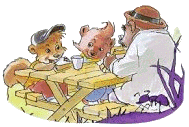Let's Talk about the Food We Eat!
Fuel for Minds and Bodies
When you had breakfast, you probably weren't thinking about powering your brain and your body, but that's exactly what your meal was doing. Food gives your body the fuel and raw materials it needs every day, especially in the morning.
Just like a car needs gasoline, you need energy to move, think and grow. The usable energy you get from food is measured in calories; the more calories a food has, the more energy it can supply. The amount of calories a person needs each day depends on his or her size and level of activity. The body stores extra calories as fat, which can be used later. It is important to have some body fat, but too much fat is unhealthy.
Calories are units used to measure energy in food. A calorie is defined as the amount of heat necessary to warm a kilogram of water (about one liter) by one degree Celsius.Of course, food provides more than just energy. It supplies building materials, such as proteins and minerals, for muscles, bones, and other body parts. Food also has vitamins that help make energy available for muscles and the brain, and make other body functions possible.
Sun Power
One way or another, all food on Earth comes from green plants and other living things that capture energy from the sun. they do this through a process called photosynthesis. The word photosynthesis means to make something new "synthesis" from light "photo." Plants make all their own food from sunlight, water, air, and nutrients in soil. Organisms that make their own food from light energy are called producers.
Animals are called consumers because they are not able to make their own food. Instead, they get the energy and other materials they need by eating plants or other animals.
Some organisms, like various members of the fungus kingdom (mushrooms and their relatives), get all of their food from pieces of dead plants and animals in soil. These organisms are known as decomposers. Many microbes, tiny organisms too small to see without a microscope, also live off rotting things.
Microbes, such as bacteria, are found everywhere. Some microbes are helpful, but others can make people sick. Sometimes harmful microbes even can be found on or growing inside food.
Food that is Safe to Eat
Most of the food you eat is grown on farms far away from your community. It is transported over long distances to reach your grocery store. Most of the food in stores is either packed in boxes, cans and jars, or kept cold or frozen to keep it from spoiling. Food spoils when too many bacteria and other microbes are growing on it. Eventually, this food will rot and smell bad. Sometimes, however, even food that looks and smells okay may not be safe to eat.
Cooking food kills bacteria and other microbes that can make you sick. It also makes food easier to digest.
Many food packages are printed with words like "use by" and a date. This information is provided to help you know whether foods are still good to eat. Foods that are old may have too many bacteria or other microbes.
It's important to wash your hands after using the bathroom or before preparing food. Microbes on your hands could end up in your meal! They also can end up on knives, spoons, cutting boards, and other things you use to prepare food.
Sometimes you hear about people getting "food poisoning." This means that they got sick from microbes in food. Keep yourself safe by following the "Tips for Healthy Living" below.
Tips for Healthy Living
- Eat a variety of foods, including plenty of vegetables, fruits, and grain products, such as pasta, cereals, tortillas, and breads.
- Don't eat too many sugary foods.
- Eat less of foods that have a lot of butter, lard, oil, or other fats.
- Wash hands with soap and warm water before preparing food and after using the bathroom, changing diapers, or handling pets.
- Rinse fruits and vegetables under running tap water before eating or cooking them.
- Wash knives, cutting boards, utensils, and cooking areas with soap and hot water.
- Avoid using the same knives and cutting boards for different raw foods, especially meats, fish, and poultry.
- Cook eggs, chicken, turkey, meats, and fish until they are well done.
- Refrigerate fresh foods and leftovers promptly.
Look for more food safety tips on the Internet: FoodSafety.gov and Food and Drug Administration.
Exploring The Invisible Universe That Lives On Us — And In Us








